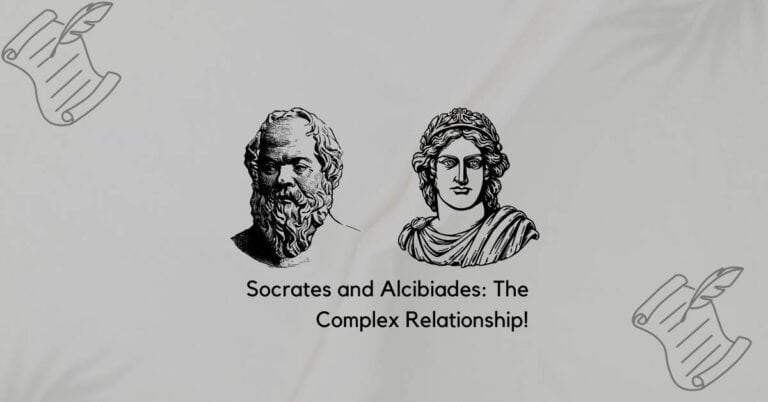Diogenes of Sinope: Crazy Like a Fox?
Imagine a philosopher who chucked comfort out the window, lived in a giant clay jar, and searched for honest people with a lantern in broad daylight. That’s Diogenes of Sinope in a nutshell! He wasn’t your typical thinker, but his crazy antics and radical ideas made him a major player in the history of philosophy.
Diogenes was a leading light in Cynic philosophy, a school of thought that isn’t just about being skeptical. It’s about challenging every norm society holds dear, advocating for a life stripped back to its basics—virtue and simplicity.
This wasn’t just about rejecting luxury; it was about finding freedom in living with less. Diogenes took this philosophy to the extreme, becoming a real-life example of “practice what you preach.”
In this post, we’ll explore how Diogenes spun his philosophy into daily actions that often left onlookers amused and sometimes bemused.
From his no-nonsense lifestyle to his biting humor, we’ll dive into his teachings, his way of life, and the legacy that keeps his name alive centuries later. Ready to see how one man lived out his truth, lantern in hand, searching for an honest man? Let’s get started.
Background of Diogenes:
Early Life and Scandal in Sinope
Diogenes of Sinope was born around 412 or 404 BCE and made his mark until his death in 323 BCE. He wasn’t destined for the spotlight from birth; rather, he forged a path into the annals of philosophy through personal upheaval and bold choices.
His story starts in the coastal city of Sinope on the Black Sea. His philosophical journey was catalyzed by a scandal involving the debasement of currency, which he and his father were accused of. This controversy led to his exile, a significant turning point that set him on a course toward a radically different way of life.
Influence of Antisthenes and the Cynic School of Thought
Diogenes was a student of Socrates’ most famous student, Antisthenes. Antisthenes, often regarded as the founder of Cynicism, laid down the philosophical groundwork that Diogenes would later adopt and personify.
His teachings emphasized virtue as the greatest good and promoted a life of simplicity devoid of material excess. Antisthenes argued that true happiness is achieved not through accumulating wealth or possessions but through a robust inner life and virtue.
This philosophy of asceticism and independence from societal norms deeply influenced Diogenes, shaping his own radical interpretations and lifestyle.
The Cynic school, derived from the Greek word ‘kynikos’, meaning ‘dog-like’, championed living in a way that was in accordance with nature, unencumbered by society’s conventions.
This philosophy not only influenced Diogenes but also set the stage for later philosophical movements, particularly Stoicism. The Cynics’ blatant disregard for materialism and social status echoed through the ages, challenging individuals to reassess their values and the societal constructs around them.
Diogenes’ Life in Athens and Corinth
Diogenes spent much of his life in Athens, the heart of intellectual debate and philosophical discourse during ancient times. His decision to live in an oversized ceramic jar (or tub) placed conspicuously in the marketplace speaks volumes about his commitment to Cynic philosophy.
This choice was not just practical but a public demonstration of his rejection of conventional living. Athens provided a perfect stage for Diogenes’ philosophical performances, where he engaged with other philosophers, critiqued societal norms, and demonstrated his principles through vivid, memorable actions.
Later in his life, Diogenes moved to Corinth. Here, one of his most famous encounters occurred with Alexander the Great, who approached Diogenes and offered to grant him any wish.
Diogenes famously responded, “Move out of my sunlight.” This response not only highlights his indifference to power but also exemplifies his belief in self-sufficiency and contentment with very little.
Diogenes’ movements between Athens and Corinth symbolize his journey through and impact on the Greek philosophical landscape. In both cities, his actions and teachings left a mark on those who observed his life, either in admiration or in criticism, and his legacy continued to provoke thought and inspire philosophical inquiry long after his passing.
Embracing a Life of Austerity
Why would someone choose to live in a large storage jar instead of a house? For Diogenes, adopting such a life of extreme simplicity was not just a personal choice but a profound rejection of societal norms.
He saw society’s pursuit of wealth and status as a trap. By renouncing material possessions and comforts, Diogenes found freedom most people never dare to seek. His lifestyle was a public statement, challenging the very foundations of what civilization at the time held valuable.
Historical and Social Context
During Diogenes’ lifetime, Greece was not only a hub of cultural and philosophical activity but also a landscape marred by political upheavals and state rivalries. It was an era marked by the opulent lifestyles of the Athenian elite, which philosophers increasingly criticized as morally corrupt.
Against this backdrop, Diogenes thrust himself into public life, using his own way of living as a critique of the prevailing values.
His radical embrace of Cynicism—a philosophy advocating for virtuous living in harmony with nature and eschewing superficialities—stood in stark contrast to the societal norms of his time.
This context is essential for understanding the profound impact of his life and philosophy.
The Core Principles of Diogenes’ Philosophy:
Main Tenets of Cynic Philosophy
Diogenes of Sinope championed the Cynic philosophy, which can be boiled down to living in virtue and simplicity.
This approach wasn’t just about minimizing physical possessions but embracing a life that was unencumbered by society’s endless demands and expectations.
Cynics like Diogenes argued that true happiness comes from self-mastery and living naturally, free from artificial constructs of society like fame, wealth, or power.
Defiance of Conventional Social Values
Diogenes was notorious for his defiance of societal norms. He often used humor and public acts to point out the folly in pursuing what society deemed important.
Whether it was mocking the teachings of Plato or disregarding public decorum, his actions were always meant to challenge and provoke thought about what truly matters in life. He questioned everything from governance to social etiquette, pushing others to rethink their values and the structures they supported.
Advocacy of Cosmopolitanism
One of Diogenes’ most radical views was his concept of cosmopolitanism. Long before it became a popular idea, Diogenes declared himself a “citizen of the world.”
This wasn’t just a philosophical stance; it was a rejection of the parochial and often divisive nature of city-state patriotism that dominated Greek life.
His belief in global citizenship emphasized that all humans belong to a single community based on morality and rationality rather than geographic or political boundaries.
By living according to these principles, Diogenes of Sinope not only shaped the philosophy of Cynicism but also left a lasting legacy on how to challenge and live beyond the superficial norms of society. His teachings encourage a reconsideration of what constitutes a good life, advocating for a return to natural, ethical living over material success and societal approval.
Notable Anecdotes and Teachings of Diogenes:
Encounter with Alexander the Great
One of the most famous stories about Diogenes involves his encounter with Alexander the Great. Alexander, impressed by Diogenes’ reputation, found him sunbathing and offered to grant him any wish. Diogenes famously replied, “Yes, stand out of my sunlight.” This simple interaction illustrates Diogenes’ belief in valuing personal freedom and happiness over power and wealth, even when offered by one of the most powerful men of the time.
Searching for an Honest Man
Diogenes is often depicted holding a lamp in broad daylight, walking through the streets of Athens. When asked what he was doing, he would answer, “I am looking for an honest man.” This act was not just a literal search but a symbolic critique of the pretenses and corruption he saw in society. It underscored his disdain for superficiality and highlighted his commitment to finding virtue, a central theme in Cynic philosophy.
Living in a Barrel
Choosing to live in a large ceramic jar (or barrel) rather than in a conventional house, Diogenes demonstrated extreme austerity and detachment from material comforts. This lifestyle choice was a practical application of his philosophy, emphasizing simplicity and independence from societal norms. By reducing his living needs to the bare minimum, Diogenes showcased the Cynic belief that true happiness does not depend on external circumstances or possessions.
Mocking Plato
Diogenes’ interactions with Plato were marked by sharp wit and philosophical dissent. In one of the most well-known anecdotes, Plato defines man as a “featherless biped.” Diogenes, ever the critic, plucked a chicken and brought it into Plato’s Academy, proclaiming, “Behold! Plato’s man!”
This humorous yet incisive action not only criticized Plato’s reliance on definitions but also underscored Diogenes’ emphasis on practicality over theoretical abstraction.
Diogenes often ridiculed Plato’s metaphysical speculations, advocating instead for a philosophy that was grounded in real-life, observable truth rather than in theoretical constructs.
Analysis of His Teachings Through These Stories
These anecdotes not only paint a picture of Diogenes’ eccentric personality but also deeply reflect his philosophical convictions.
His encounter with Alexander the Great serves as a testament to his belief that personal contentment should never be sacrificed for external power.
His quest with a lamp highlights his lifelong dedication to exposing societal hypocrisy and his commitment to virtue. Living in a Barrel illustrates his teachings on self-sufficiency and the joy of living simply, free from the chains of societal expectations.
Through his bold actions and sharp wit, Diogenes challenged his contemporaries to rethink their priorities and question their values.
His life and methods were a living embodiment of his philosophy, serving as a call to focus on what truly matters—virtue, honesty, and true independence from societal constraints.
Each story not only entertains but also invites readers to reflect on their own lives and the societal norms they accept.
Diogenes’ Interactions with Contemporary Philosophers:
Contrast with Aristotle
Aristotle’s philosophy, which emphasized categorizing and defining the natural world through empirical observation and logical reasoning, also diverged sharply from Diogenes’ approach.
Where Aristotle sought to understand the world by classifying it, Diogenes believed in deconstructing societal constructs to reveal the value of a natural and virtuous life.
Aristotle’s focus on ethics as a means to achieve eudaimonia (flourishing or happiness) through moderate living and social behavior stood in contrast to Diogenes’ call for extreme asceticism and rejection of social norms.
Diogenes and the Cynics vs. the Stoics
While not a contemporary, the later Stoic school, influenced by Cynic philosophy, provides an interesting contrast. Stoics like Zeno of Citium took cues from Diogenes but adapted the Cynic disregard for materialism into a more systematic philosophy that still embraced social roles and responsibilities. Stoicism maintained that virtue is sufficient for happiness but sought a balance in living according to nature, which included participating in social and civic life—something Diogenes might have scoffed at.
Highlighting Diogenes’ Unique Approach
Diogenes stood out from his philosophical peers by living his philosophy as a public spectacle. While Plato and Aristotle engaged in academic discourse within the walls of the Academy and the Lyceum, Diogenes turned the whole city of Athens into his stage.
He used his lifestyle and public actions to challenge not only philosophical ideas but the very fabric of Athenian society. His direct and often theatrical demonstrations were not just philosophical arguments but were also calls to action, urging a reevaluation of societal values and norms.
Diogenes’ philosophy was radically personal and provocative. He did not merely talk about virtue and ethics; he lived them out loud in ways that were impossible to ignore. His interactions with other philosophers weren’t just debates but were challenges that questioned the foundations of their philosophical systems.
By contrasting his approach with that of his contemporaries, we see a philosopher who was not only ahead of his time but also deeply connected to the core of human existence—free from the trappings of society’s conventions.
Diogenes’ Legacy and Influence on Later Philosophy:
Influence on Stoicism
Diogenes’ philosophical ideals didn’t end with him; they significantly shaped Stoicism, a movement that borrowed heavily from the Cynics but added its own structured approach to living a virtuous life. Stoicism, founded by Zeno of Citium, who was directly influenced by Cynicism, espoused resilience, emotional control, and alignment with nature.
However, it did so within the context of accepting social roles, something Diogenes might have criticized. Still, the Stoic emphasis on inner freedom and the indifference towards external goods are clear echoes of Diogenes’ teachings.
Impact on Modern Philosophical and Cultural Movements
Moving beyond ancient philosophy, Diogenes has also left a mark on modern philosophical thought, particularly existentialism.
His emphasis on living authentically and in defiance of societal expectations mirrors the existentialist call to forge one’s own path and meaning in a seemingly indifferent universe. Philosophers like Nietzsche and Kierkegaard, who challenged the status quo and questioned societal norms, can be seen as intellectual descendants of Diogenes.
In the cultural realm, Diogenes’ influence is palpable in the minimalism movement, which advocates for simplicity and questions the need for excess in modern life. Minimalism, much like Diogenes’ philosophy, promotes finding contentment in the essentials, freeing individuals from the clutches of consumerism and superficial societal demands.
Criticisms and Controversies Surrounding Diogenes:
Diogenes wasn’t exactly everyone’s cup of tea. Some folks, even other philosophers, thought his antics were a bit much. Plato, for example, supposedly called him a “Socrates gone mad!” Ouch!
There are also some misconceptions swirling around Diogenes. People often see him as just a wacky dude who liked living in a barrel and causing a stir. But there was more to him than that! His crazy stunts were actually a way of making a point about society’s messed-up priorities.
Here’s the thing: Diogenes wasn’t afraid to challenge the status quo. He questioned authority, poked fun at social norms, and lived a life that went against the grain. This, of course, ruffled some feathers. But hey, sometimes a little ruffle is what it takes to get people thinking!
The Relevance of Diogenes in the Modern World:
Simplicity and Contemporary Movements
Diogenes’ radical call for simplicity finds a strong echo in today’s minimalism movement. In a world overwhelmed by consumerism and excess, minimalism advocates for a similar stripping back to essentials, prioritizing experiences and personal growth over material wealth.
This philosophy aligns closely with Diogenes’ life in a barrel, showcasing that happiness does not stem from possessions but from a deeper, internal state.
Moreover, Diogenes’ lifestyle can also be connected to modern environmental sustainability efforts. His example promotes a low-impact way of living that reduces waste and environmental footprint, principles increasingly relevant as the world faces ecological crises. By living minimally and using only what he truly needed, Diogenes was perhaps one of the earliest proponents of what we now call sustainable living.
Challenges to Authority and Social Norms
Diogenes’ open defiance of societal norms and authority offers powerful lessons on personal freedom and authenticity. In today’s society, where social pressures and the pursuit of approval often dictate personal and professional choices, Diogenes teaches the value of authenticity over acceptance.
His willingness to confront the most powerful figures of his time, like Alexander the Great, with nothing but sharp wit and philosophical insights, encourages a form of courage that is about being true to one’s self rather than conforming.
Conclusion:
Diogenes of Sinope was more than just a philosopher; he was a cultural critic and a social revolutionary. His philosophy of Cynicism, with its emphasis on virtue, simplicity, and defiance of societal norms, offers timeless lessons that are remarkably relevant today.
Whether it’s through the lens of minimalism, environmental sustainability, or the courage to stand against popular opinion, Diogenes’ life and teachings continue to inspire those searching for a more meaningful and authentic existence.
As we navigate the complexities of modern life, the figure of Diogenes, with his lantern in search of an honest man, reminds us to seek our own truth.
He challenges us to ask ourselves whether we live as authentically as we can and whether our pursuits bring us genuine happiness or simply tether us more tightly to societal expectations. In this way, Diogenes of Sinope is not just a historical figure to be studied but a continued presence to be reckoned with, urging us to light our own lanterns in the quest for a life truly worth living.



